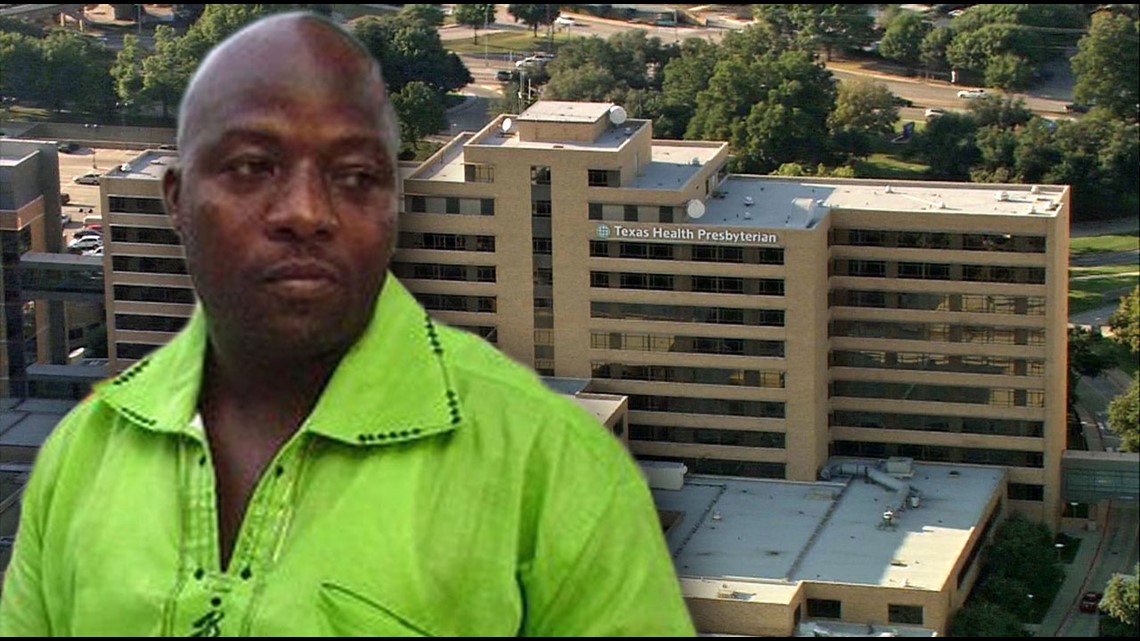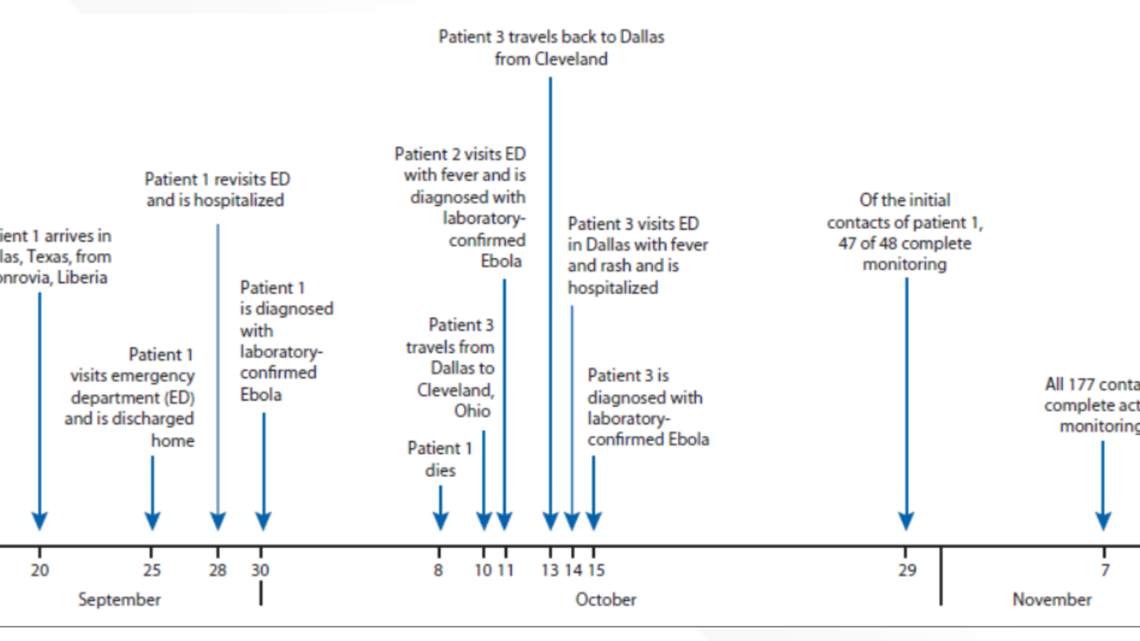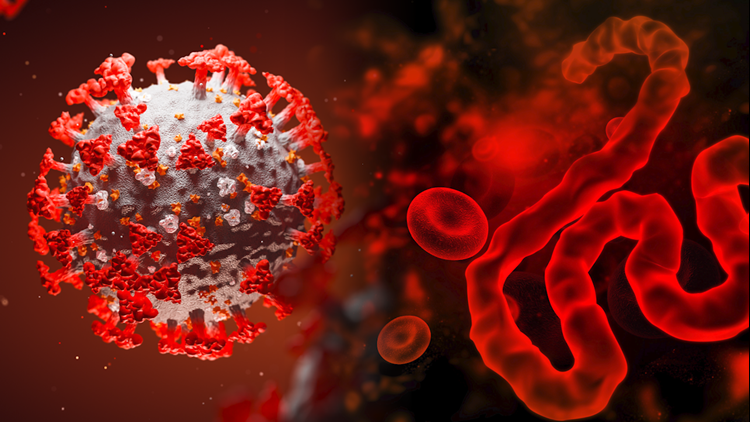It has now been six years since Dallas health officials confirmed the nation's first case of Ebola.
When the COVID-19 outbreak started in March, many Dallas officials said the area's previous experience with the Ebola virus would help them with this new virus.
On Sept. 30, 2014, the Centers for Disease Control and Prevention confirmed that "Patient 1" was positive for the Ebola virus at Texas Health Presbyterian Hospital in Dallas and was in "strict isolation." It would later be revealed this patient was Thomas Eric Duncan.
Within hours of confirmation, the CDC sent a team to Dallas.
According to a 2014 CDC press release, the initial objectives were to "1) Identify potentially exposed contacts of the Ebola patient, 2) initiate monitoring of contacts, 3) review plans for triaging and testing suspected Ebola patients, and 4) review infection control practices."
The Dallas patient remained in "strict isolation" at the hospital that first day. Officials said there were no plans to transfer him to a specialized hospital with a biocontainment unit.
CDC director Dr. Tom Frieden gave a brief timeline of the patient's infection during a news conference on Sept. 30.
- Sept. 19: The adult patient boards a flight to the U.S. in Liberia after being screened for Ebola symptoms
- Sept. 20: The patient arrives in the United States
- Sept. 24: Patient shows first symptoms of Ebola
- Sept. 26: Patient seeks initial medical care
- Sept. 28: Patient admitted to Texas Health Presbyterian Hospital Dallas
However, it was later revealed that Duncan showed up in the emergency room at Texas Health Presbyterian Hospital in Dallas on the evening of Sept. 25, 2014. According to the hospital, he presented with a temperature of 100.1 degrees, abdominal pain, a headache and decreased urination.
Duncan returned to the hospital by ambulance on Sept. 28, 2014.
On March 10, 2020, Dallas County reported its first and second presumptive positive cases of COVID-19.
Dallas County Health and Human Services said its first patient was a 77-year-old who traveled to Dallas from out of state by vehicle and had an extensive travel history. The patient was being treated at a Dallas-area hospital.
Health officials also reported a second "presumptive positive" case, a patient in their 50s who was in close contact with the first patient.
Jenkins said Dallas County Health and Human Services completed contact tracing and notified anyone who had close contact with the patient in Texas.
Officials said those people had been placed in isolation, and if they become symptomatic, then they would also be tested.
As of that time, this is what health experts were recommending to take preventative actions against COVID-19:
- Avoid close contact with people who are sick.
- Avoid touching your eyes, nose, and mouth.
- Stay home when you are sick.
- Cover your cough or sneeze with a tissue, then throw the tissue in the trash.
- Clean and disinfect frequently touched objects and surfaces using a regular household cleaning spray or wipe.
- Follow CDC’s recommendations for using a facemask.
- Wash your hands often with soap and water for at least 20 seconds, especially after going to the bathroom; before eating; and after blowing your nose, coughing, or sneezing.
- If soap and water are not readily available, use an alcohol-based hand sanitizer with at least 60% alcohol. Always wash hands with soap and water if hands are visibly dirty.
- Consult CDC’s travel website for any travel advisories and steps to protect yourself if you plan to travel outside of the US
The CDC would later add these two recommendations:
- Wear a face covering.
- Practice "social distancing" and stay at least 6 feet away from others and avoid large public gatherings
In 2014, health officials used contact tracing to identify 48 people who were potentially exposed to the Ebola virus. Of those, 17 were with the patient before he was admitted to the hospital and while he was symptomatic and 10 were in Duncan's ambulance before it had been disinfected.
Another CDC press release from the day the Ebola case was confirmed said that the Duncan had recently returned from West Africa but developed symptoms after getting back to the U.S.
The CDC also said that its data show that Ebola is not spread through casual contact or through the air and instead through direct contact with bodily fluids of a sick person or exposure to objects such as needles that have been contaminated. The illness has an average eight to 10 day incubation period (although it can range from two to 21 days).
Beginning Oct. 1, 2014, all 48 contacts underwent direct active monitoring for 21 days (the upper limit of the Ebola incubation period) from their last exposure date. Six close community contacts were quarantined.
On Oct. 2, 2014, five members of the Dallas County Sheriff's Department who were briefly inside the apartment where Duncan stayed were temporarily put on leave.
They had gone there on the orders of Sheriff Lupe Valdez to get the people inside to sign a court order forbidding them from leaving the apartment.
On Oct. 6, 2014, a crew contracted by Dallas County decontaminated the unit where Duncan and his family lived. They were relocated from the apartment and moved into a private residence in Dallas County.
Duncan died on Oct. 8, 2014.


On Oct. 11, a nurse previously involved in direct care of Duncan developed a fever and sore throat. She was confirmed to have Ebola later that day. She was the second case.
Four days later, another nurse with similar exposure was confirmed to have the virus.
These two nurses were Nina Pham and Amber Vinson. They both survived.
There were 147 contacts of these three patients. The CDC says it had officials monitoring them for 21 days from their last exposure to an Ebola patient.
Those who had been in any of the three patients' rooms were instructed not to use any long-distance or local public conveyances. Those who had been in Duncan's room were additionally instructed not to attend mass gatherings.


On Oct. 15, 2014, Texas Health Presbyterian Hospital in Dallas offered a public apology for misdiagnosing Duncan.
The hospital also said that it failed to provide accurate information after it was revealed that Presbyterian was caring for a patient with Ebola.
The next day, nurses at Texas Health Presbyterian Hospital Dallas said they were recklessly placed in harm's way.
According to union officials, the Dallas nurses said Duncan "was left for several hours in an area where other patients were present." They said Duncan's lab specimens were sent through the usual hospital tube system "without being specifically sealed."
On Nov. 5, Dallas was officially "all clear" of the Ebola virus. The last person being monitored in connection with Texas' three patients, a hospital worker who handled medical waste, was cleared from twice-daily monitoring.
In that final time period, there were 177 people who came in contact with the three patients (some persons were contacts of more than one patient) completing 21 days of monitoring. Those people included health care workers, household contacts and community members who had contact with Duncan or his specimens.
On March 5, 2020, Dallas County Judge Clay Jenkins said that the COVID-19 situation at that time felt like 2014 again and the way the county handled Ebola would guide the county's decisions moving forward.
“A lot of what we did in Ebola became the blueprint for future outbreaks," Jenkins said. "I get phone calls daily now. And monthly up until now."
Jenkins said many of the steps Dallas-area officials used during Ebola are now part of the CDC’s playbook for outbreaks.
On March 11, 2020, former Dallas County Medical Society president Dr. John Carlo gave an interview 24 hours after the county's first COVID-19 case.
He said North Texas was "more prepared" because of lessons learned from the 2014 Ebola situation.
“What we learned from the Ebola experience on protecting healthcare workers is really helping us this time around,” he said. “These are battle wounds we remember very, very well. You learn from them. You have to learn from them.”
At that time, Carlo said COVID-19 seems to be more easily transmissible and that the Ebola virus "happened quickly and went away relatively quickly, thankfully. But, [with coronavirus] we’re not seeing anything that’s going to lead us to think we’re going to slow down.”
The CDC last updated its "How to Protect Yourself & Others" section on Sept. 11. The recommendations include:
- Wash your hands often
- Avoid close contact
- Cover your mouth and nose with a mask when around others
- Cover coughs and sneezes
- Clean and disinfect
- Monitor Your Health Daily



